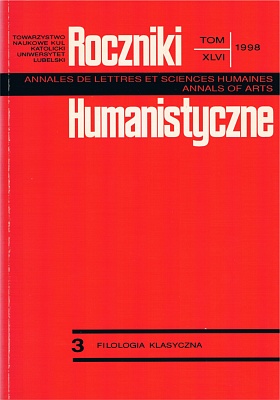Ad posteritatem − the Addressee in the Autobiographical Elegies by Klemens Janicki, Eobanus Hessus and Ovid
Abstract
The paper seeks to show the way in which to carry out the principle imitatio antiquorum in the works of Klemens Janicki and Eoban Hessus, addressed to Posterity. Both poets manifest a conscious and deliberate imitation of the tenth elegy from Book Four of Ovid's Tristia. Once the recipient has noticed this fact he enter some special relationship in the process of literary communication. The condition to discover the sense and proper interpretation in this relationship common to both levels of reference, not only to the code of the language and, generally, to literature, but also reference to another text, another statement. This new text may be perceived against the background of the relationships which combine it with other texts, owing to references and associations. The Imitatio is an invitation to a double reading of the texts, for they are multiplied by the intertextual relationships between the model and the work.
The first difference that stands out in the analysis is another conceptions of the collections in which the autobiographies have been placed. For this reason Janicki is closer to Ovid, by placing the autobiographic elegy in the collection of the Tristia. Hessus closes the autobiography with a cycle of Christian Heroids. Consequently, we have a different conception of the addressee. Now, who is this Posterity with each of the three poets?
With Ovid the Posteritas is the future generations of the readers (studiosa pectora, candidus lector) interested with his poetry, which is one of the necessary elements of fame. The Posteritas with Janicki is, similar like with Ovid, a kind reader who once in the future will, perhaps, want to know the life of the poet. The relationship, however, between the Polish-Latin poet and fame is different. Janicki did not thank, as Ovid did, the future generations of readers for his immortal fame. He expressed his gratitude to the physician who prolonged his life in this world. After death he would praise him in another world, for then he would not be able to secure fame for anyone among the living. In the face of death the humanistic understanding of immortality gives way to the Christian understanding, although some expressions (e.g. manes) do not belong to Christian vocabulary. The problem with the addressee is entirely different in the elegy of Hessus, wherein the addressee is a personified Posteritas.
Copyright (c) 1998 Roczniki Humanistyczne

This work is licensed under a Creative Commons Attribution-NonCommercial-NoDerivatives 4.0 International License.





